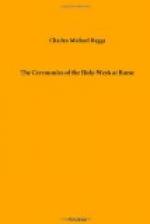Gesu, Giuseppe, Maria, Vi dono il cuore e l’ anima mia. Gesu, Giuseppe, Maria, Assisteleci nell’ ultima agonia, etc.
They afterwards wait on them at table, and accompany them to their beds, reciting other devout prayers. In another part of that establishment, princesses and other ladies practise the same offices of charity towards the female pilgrims. Here might we fancy that the primitive christians were before us, those men of charity, simplicity, and lowliness: and when in the same place, a few years ago, that devout Pontiff Leo XII on his knees washed and kissed the feet of pilgrims, who had journeyed from afar; who that saw him did not call to mind with tears the lowliness and charity of his predecessor Peter, and of a greater than Peter, who “washed the feet of his disciples, and who wiped them with the towel wherewith he was girded”.
Marius mourned over the ruins of Carthage; but his was the sorrow of disappointed, selfish ambition. Jeremiah lamented the fall and desolation of Jerusalem: and his plaintive accents were inspired by genuine patriotism and religion. Observe his venerable figure in the Sixtine chapel; there he sits pensive and disconsolate, with his legs crossed, his wearied head resting upon his hand, and his eyes rivetted on the ground, as if nothing could engage his attention but the woes of the daughter of Sion[55]. Then listen to the lamentations of this inspired and afflicted prophet: they are full of deepest pathos, and uttered in notes sweet as the warblings of philomel. Turn now, O Christian soul, to a more sublime and mournful spectacle. Jesus in the garden of Gethsemani and on mount Calvary mourned not for a single city or nation: he sorrowed over the ruins of a world, not as of old Noah may have done, when secure from danger he looked down upon the waters which overspread the earth; but “He was wounded for our iniquities, and he was bruised for our sins: and the Lord hath laid on him the iniquities of us all”, He suffered and died for us. The moral ruins of the world, our sins and their awful consequences, caused all the pangs and sorrows of Jesus. Come then let us cast ourselves at the foot of that cross, and cry aloud for mercy with a contrite and humble heart, which He will never despise. To Thee alone, shall we say, have we sinned, and have done evil before thee; yet have mercy on us, O God, according to thy great mercy. And thou, O blessed Virgin and Mother, who standest in silent anguish beneath the cross of thy agonising Son[56], would that we could feel love and sorrow like unto thine.
Eja mater fons amoris Me sentire vim doloris Fac, ut tecum lugeam. Fac, ut ardeat cor meum In amando Christum Deum, Ut sibi complaceam. Amen.
[Footnote 46: See also Palmer’s Origines Liturgicae, Vol. 1 Antiq. of the English ritual c. 1, p. 1. Both writers do not hesitate to admit that the breviary is the great source of the Church of England’s Morning and Evening prayer.]




